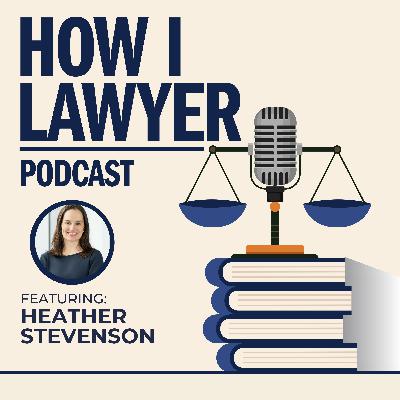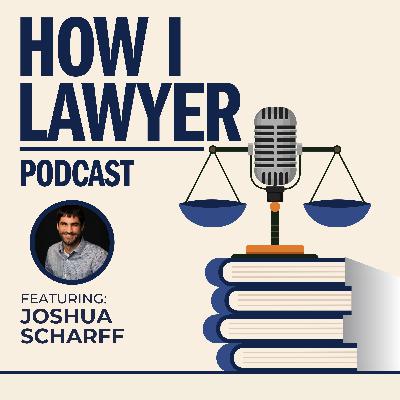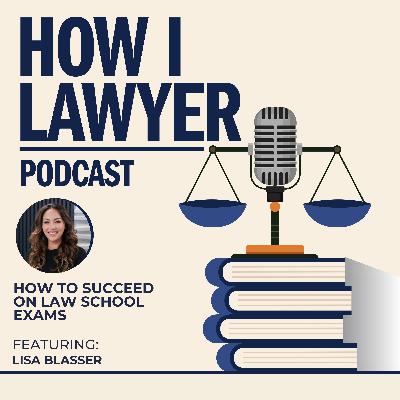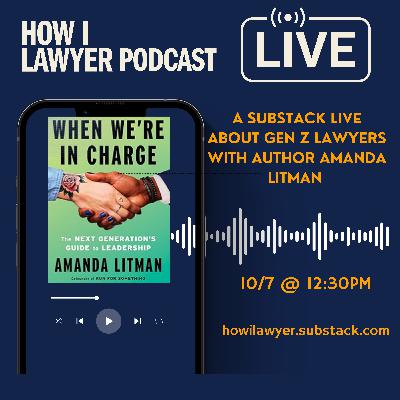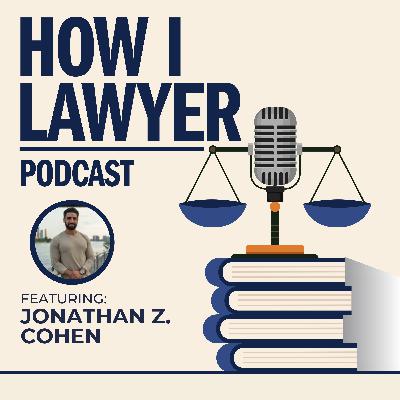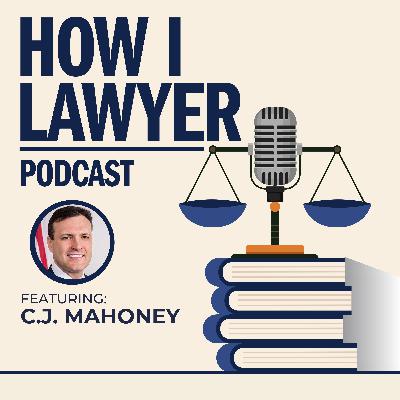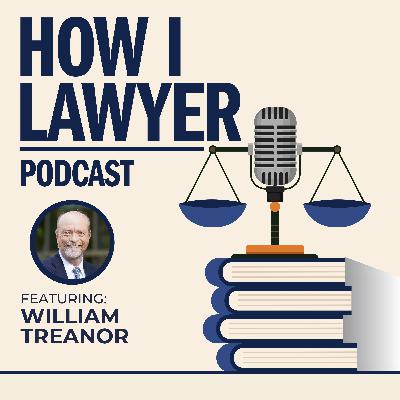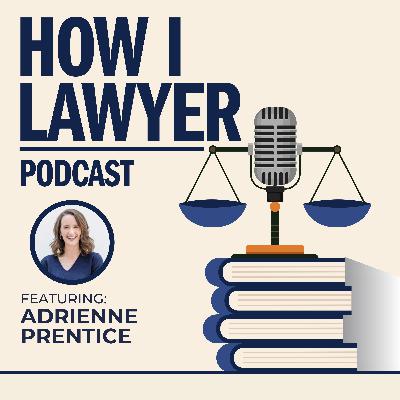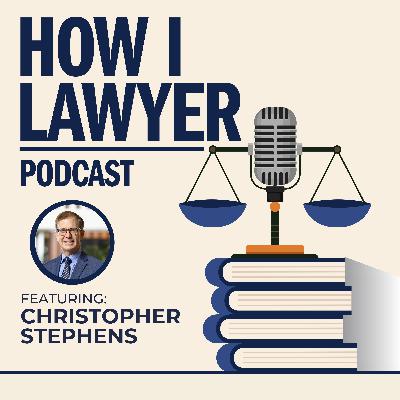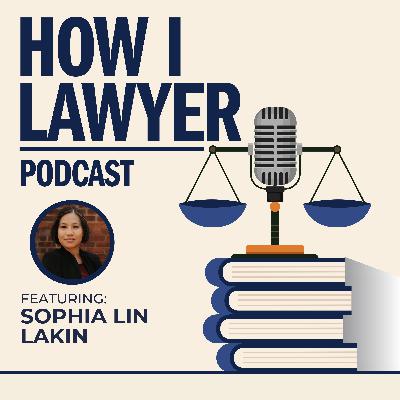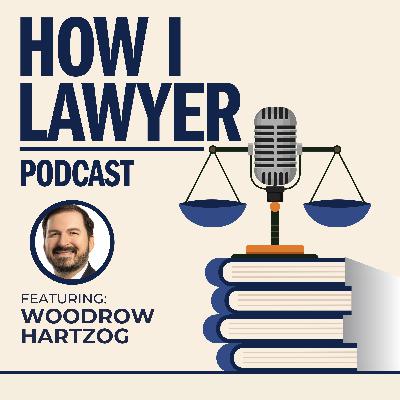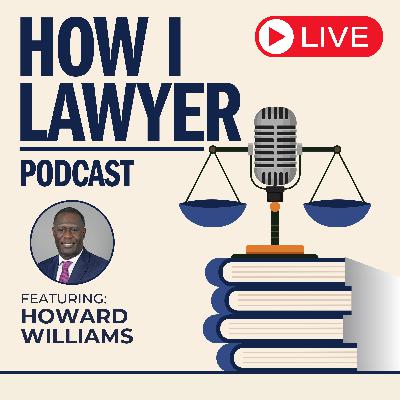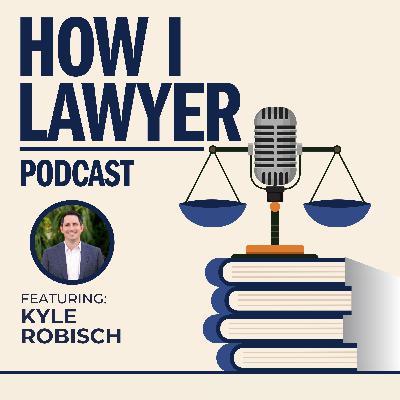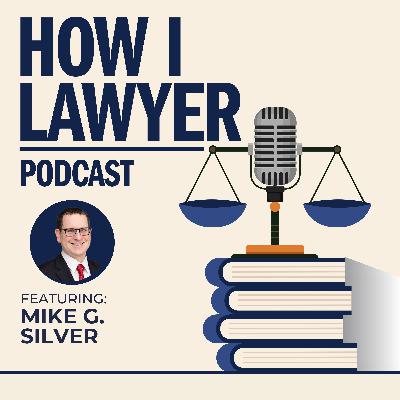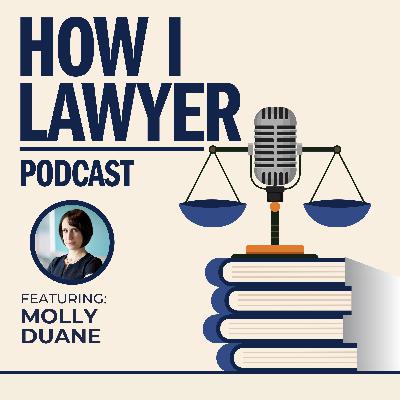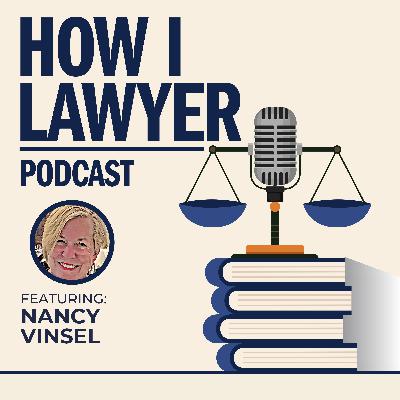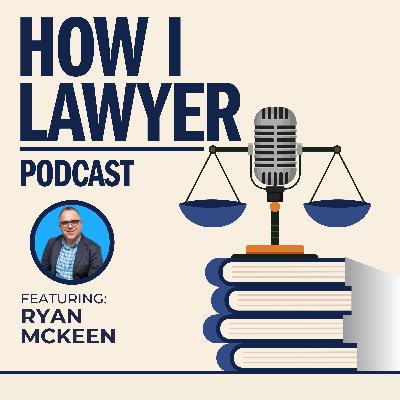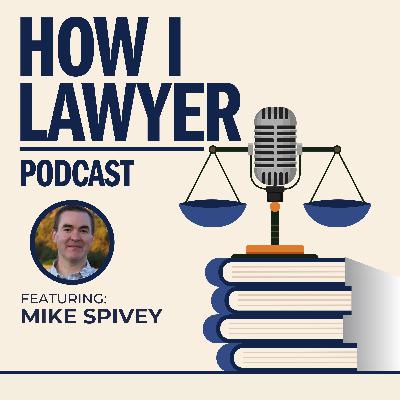Discover How I Lawyer Podcast with Jonah Perlin
How I Lawyer Podcast with Jonah Perlin

152 Episodes
Reverse
Welcome back to another episode of the How I Lawyer Podcast, where Professor Jonah Perlin interviews lawyers about what they do, why they do it, and how they do it well.Today's guest is Heather Stevenson, the General Counsel at RedCell (a venture firm and incubator that starts and invests in companies across national security, cyber, and healthcare). Before her current role, Heather worked as a litigator at Sullivan Cromwell, served as Deputy General Counsel at the Boston Globe, and notably owned a successful juice bar business for several years. Heather and Jonah met as founding board members of the Legal Mentor Network, a nonprofit dedicated to providing free mentorship to junior lawyers. Heather graduated from Columbia University and Columbia Law School, where she was a Harlan Fisk Stone Scholar.In this episode, Heather shares valuable insights about the legal profession including:👨👩👧👦⚖️ How having two lawyer parents influenced her career path, though she still had much to learn about the modern legal profession despite this advantage [2:26]🏢📝 How her early career plan to become a big law partner changed when she realized the full lives of senior lawyers didn't align with what she wanted for herself [5:25]🥤💼 How she and her husband transitioned from big law to entrepreneurship by opening a juice bar business, which became a hands-on MBA experience [8:33]📊🧠 How her business experience proved invaluable when returning to legal practice, particularly for in-house roles where understanding business operations is essential [16:07]📰⚖️ How she secured her position at the Boston Globe despite lacking traditional media experience by emphasizing her transferable skills and business knowledge [17:01]🔄🚀 How her varied background—big law training, in-house experience, and entrepreneurship—uniquely qualified her for her current role at RedCell [24:40]🙋♀️💡 How women should apply for jobs even when they don't meet all listed requirements, as studies show men typically apply with fewer qualifications [27:18]👥🤝 How building genuine relationships and community (rather than traditional networking) is crucial for career advancement [29:26]🧠👨🏫 How mentoring others has been a fulfilling way to give back, starting with helping those just one step behind her career-wise [30:58]📝🔍 How mentees can get the most from mentorship by coming prepared with specific questions and following up regularly [35:22]⏱️🧘♀️ How embracing "seasons of life" helps balance parenting and career demands, recognizing that different periods require different priorities [37:46]📚🔄 How new lawyers should prioritize learning opportunities over billable hours, as investing in growth is essential for long-term career development [41:19]This episode is sponsored, edited, and engineered by LawPods, a professional podcast production company for busy attorneys.For more from Heather, follow her on LinkedIn or subscribe to her newsletter "In House Outside the Box" for in-house lawyers interested in building careers on their own terms.
In today’s episode I speak with Josh Scharff who is the General Counsel & Director, Programs at Brady, the Campaign to End Gun Violence. Before joining Brady more than 5.5 years ago, Joshua served as an associate at Peer, Gan, & Gisler LLP, a Washington, D.C.-based law firm with a nationwide litigation practice and a special focus on effective resolution of labor and employment disputes. Joshua is a graduate of Rutgers (Go Scarlett Knights), the George Washington University Law School(Go Colonials), and holds a Masters in International Studies from John Hopkins School of Advanced Internal Studies (Go Blue Jays). This episode is sponsored, edited, and engineered by LawPods, a professional podcast production company for busy attorneys.👍 Want to Support the Podcast in 2 minutes or less? Leave a Review (this helps the algorithm connect me to new listeners) Subscribe on iTunes or Spotify Purchase How I Lawyer Merchandise Share on LinkedIn or Twitter
Today's special episode of How I Lawyer focuses on law students! In it, Jonah speaks with Lisa Blasser who is the founder of the Law School Success Institute and author of "The Nine Steps to Law School: A Scientifically Proven Study Process for Success: A Scientifically Proven Study Process for Lawyers." I asked Lisa to join me on the podcast for this special episode of How I Lawyer to talk about how to succeed on law school exams. This episode is targeted at law students and I hope you’ll give it a listen and share it with anyone you know just getting started.Lisa is kindly offering How I Lawyer listeners a 10% discount on her flagship Law School Operating System Recorded Course by entering coupon code HOWILAWYER10 at checkout (23 modules and a Workbook, to be completed in four hours).This episode is sponsored, edited, and engineered by LawPods, a professional podcast production company for busy attorneys.
In this special Substack LIVE Episode of How I Lawyer recorded on 10/7/2025, Jonah spoke with Amanda Litman, the author of the new book When We're In Charge and recognized expert on the Gen Z workforce.
Welcome back to another episode of the How I Lawyer Podcast, where Professor Jonah Perlin interviews lawyers about what they do, why they do it, and how they do it well.Today's guest is Jonathan Z. Cohen, Associate General Counsel for PNY Technologies and Business Development lead for North America. Beyond his corporate role, Jonathan educates lawyers on wellbeing, stress management, and mental fitness through CLEs, keynotes, and workshops. His professional background includes serving as an Assistant District Attorney in the Bronx. Jonathan holds degrees from Muhlenberg College and Touro University Law and School of Business.In this episode, Jonathan shares valuable insights about the legal profession including:🧠💪 How his journey from struggling student to accomplished attorney shaped his understanding of personal potential and the power of overcoming limiting narratives [02:01]🌍✈️ How taking time off before college transformed his discipline, structure, and approach to challenges [03:54]📚🎓 How he became one of the first graduates of Touro Law's JD/MBA joint degree program, transitioning from academic struggles to graduating in the top of his class [06:43]⚖️👨⚖️ How his experience as a Bronx prosecutor provided invaluable courtroom experience while teaching him to learn from more seasoned attorneys [12:17]🏢💻 How he transitioned from criminal law to the technology sector, joining PNY Technologies and its partnership with NVIDIA before AI became mainstream [19:35]😓🧘♂️ How the shift from high-stakes prosecution to corporate law allowed his nervous system to "calm down a thousand degrees" while still maintaining professional challenge [23:21]🔍🧠 How awareness is the foundation of all personal and professional development, especially for managing burnout in the legal profession [32:20]📝💯 How creating an "evidence frame" list of your credentials and preparation can combat imposter syndrome in high-pressure situations [34:25]🏃♂️🏆 How setting ambitious physical challenges creates structure that positively impacts all areas of life, including professional performance [40:02]🎓⚖️ Why new lawyers should ignore negative narratives about the profession and recognize that legal training provides skills that can be applied in countless ways [44:54]This episode is sponsored, edited, and engineered by LawPods, a professional podcast production company for busy attorneys.
Welcome back to another episode of the How I Lawyer Podcast, where Professor Jonah Perlin interviews lawyers about what they do, why they do it, and how they do it well.Today's guest is C.J. Mahoney, the Corporate Vice President and General Counsel at Microsoft. Before joining Microsoft, C.J. served as the Deputy United States Trade Representative (a position to which he was unanimously confirmed) and was previously a partner at Williams & Connolly. He started his career as a law clerk for Associate Justice Anthony Kennedy after graduating from Yale Law School where he was Editor-in-Chief of the Yale Law Journal and attending Harvard University. C.J. was also one of Jonah'sfirst legal supervisors when he was a summer associate at Williams & Connolly 15 years ago.In this episode, C.J. shares valuable insights about the legal profession including:🏙️🧩 How growing up in a small Kansas town where lawyers were well-respected influenced his decision to pursue law as a career path [1:59]🎓⚖️ How his journey through Yale Law School and prestigious clerkships ultimately led him to realize he wanted to learn how to try cases rather than focus solely on appellate work [3:46]🔄🌟 How his career path wasn't as linear as it might appear on LinkedIn, but rather involved being open to new opportunities and distinguishing himself from other talented lawyers [6:48]📝💼 How his litigation skills proved surprisingly transferable when he moved to trade negotiations, particularly in synthesizing complex information and cross-examining experts [14:19]🧠📊 How the ability to take complex facts and make them understandable is a superpower that has served him well across different roles [18:13]✍️🔍 How writing things down and putting concepts in your own words is crucial for learning new areas and sharpening your thinking [18:44]⚖️💻 How his perspective on litigation changed dramatically once he moved in-house and saw firsthand the burden it places on businesses [24:52]🤝💯 How building trust is the most important aspect of managing people, particularly in creating an environment where people feel comfortable bringing bad news [27:12]🌐🔮 How the intersection of AI advancement and political polarization creates unique challenges and opportunities for lawyers in the technology sector [34:11]⏳🏆 How sticking it out through hard times at a law firm and building a strong foundation was one of the best career decisions he made [41:06]This episode is sponsored, edited, and engineered by LawPods, a professional podcast production company for busy attorneys.
Welcome back to another episode of the How I Lawyer Podcast, where Professor Jonah Perlin interviews lawyers about what they do, why they do it, and how they do it well.Today's guest is William (Bill) Treanor, who recently stepped down as Dean of Georgetown University Law Center after serving for 15 years. Before Georgetown, Bill was a professor and later Dean at Fordham Law School for 20 years. His legal career began as a law clerk to Judge James L. Oakes of the U.S. Court of Appeals for the Second Circuit and as associate counsel during the Iran-Contra Investigations. From 1998 to 2001, he served as Deputy Assistant Attorney General for the Office of Legal Counsel. Bill holds degrees from Yale University, Yale Law School, and a PhD in history from Harvard University.In this episode, Bill shares valuable insights about the legal profession including:🎓🔄 How a pivotal lunch conversation with Harvard professor Henry Louis Gates Jr. changed his career trajectory and led him to pursue both a JD and PhD to maximize his impact on future generations [03:00]👨⚖️🔎 How his experience working on the Iran-Contra investigation provided invaluable trial experience and showed him the importance of thinking on your feet in high-pressure situations [09:00]⚖️👨🏫 How he unexpectedly transitioned from government service to academia when Fordham Law offered him a tenure-track position rather than the visiting role he initially sought [19:00]📚🏛️ How his early teaching experience involved staying just one week ahead of his students in property law courses – demonstrating the importance of adaptability in legal education [21:00]🌟🏢 How his decision to pursue a deanship was motivated by a desire for more tangible impact and the opportunity to work with teams to build institutions [24:00]🎯🔄 How serendipity and a handful of phone calls played crucial roles in his career transitions, including his move from Fordham to Georgetown [32:00]💰🎓 How his commitment to expanding access to legal education was inspired by his family history and led to doubling financial aid and creating opportunity scholarships at Georgetown [35:00]🧩🔍 How the RISE program has transformed outcomes for students from backgrounds without exposure to law, with many becoming Law Journal editors and Student Bar Association presidents [36:00]⏱️🔑 How the average law school dean tenure of four years is insufficient to make meaningful change, and why he advocates for longer-term commitments to leadership positions [41:00]🌱💼 How new lawyers should remain optimistic, nimble, and hardworking while building and maintaining strong personal networks that will support both career advancement and personal satisfaction [45:00]This episode is sponsored, edited, and engineered by LawPods, a professional podcast production company for busy attorneys.
Welcome back to another episode of the How I Lawyer Podcast, where Professor Jonah Perlin interviews lawyers about what they do, why they do it, and how they do it well.Today's guest is Adrienne Prentice, CEO and Founder of Keep Company, a group learning platform helping legal organizations empower their teams with essential skills for the modern workplace. Before founding Keep Company, Adrienne's impressive career included roles as Manager of Attorney Talent at Hogan Levels, Vice President and Associate General Counsel at Hewlett Packard, and various positions at law firms and private companies. She holds degrees from Cornell University and American University's Washington College of Law.In this episode, Adrienne shares valuable insights about the legal profession including:🎓💼 How following her gut and being open to opportunities led her from labor relations studies to corporate law [1:25]👥🌟 How choosing mentors and practice areas based on people rather than just subject matter shaped her early career [2:22]📚✨ How hands-on partner mentorship in 2007 provided invaluable learning experiences through direct observation [3:41]📊💡 How the 2008 recession created unexpected career opportunities in green tech and federal recovery funding [6:07]🤝📈 How sponsorship differs from mentorship in law firms and why it's crucial for career advancement [26:45]💪🎯 How doing good work alone isn't enough - you need strategic relationships and advocates [28:26]👨👩👧👦💼 How the legal profession is evolving in supporting parents and caregivers, with room for improvement [38:46]🌱🔄 How law firms need to expand support beyond new parents to address challenges at all parenting stages [41:04]🤝💫 How the pandemic has allowed fathers to be more vocal about work-life integration [43:34]This episode is sponsored, edited, and engineered by LawPods, a professional podcast production company for busy attorneys.
Welcome back to another episode of the How I Lawyer Podcast, where Professor Jonah Perlin interviews lawyers about what they do, why they do it, and how they do it well.Today's guest is Christopher Stephens, the Senior Vice President and General Counsel of the World Bank Group, a role he has held since 2022. Before joining the World Bank Group, Chris served as General Counsel of the International Finance Corporation (the private sector arm of the World Bank) and General Counsel of the Asian Development Bank. Earlier in his career, he was Managing Partner for Asia and a member of the management committee at Orrick, Herrington & Sutcliffe, where he was based in Hong Kong. He is a graduate of Colgate University and New York Law School.In this episode, Christopher Stephens shares valuable insights about the legal profession including:🏢💼 How his desire to avoid the repetitive nature of advanced microeconomics led him to pursue law as a career that would provide variety in clients and challenges [1:38]📝🔄 How his initial "two-year plan" to work in Big Law before joining his father's small firm evolved into a much longer career path as he got caught up in the partnership track [3:46]📊💰 How the 1980s "decade of greed" created a frenzy of transactional work with leveraged buyouts, management buyouts, and private equity deals that shaped his early career [5:27]🌐📈 How the American legal market's focus on profits per partner, which increased partner mobility [7:10]🌏💱 How the 1997 Asian currency crisis forced him to reinvent himself as a China Investment Lawyer just six months after arriving in Hong Kong [11:42]🏦⚖️ How moving from a law firm to an in-house position at the Asian Development Bank represented a major shift from a business where law is the product to one where legal is a support function [19:21]🌉🤝 How the public sector mindset differs from private practice, with a focus on outcomes like poverty elimination rather than profit [23:43]🎓📚 How law students should take challenging courses like tax, environmental law, accounting, and international law that are difficult to learn after graduation [26:45]🧠🔍 How critical thinking is the most important skill for young lawyers, who should question conclusions rather than accepting them at face value [34:30]🛣️🔄 How being open to change and adapting plans can lead to better opportunities and more enriching professional experiences [37:36]This episode is sponsored, edited, and engineered by LawPods, a professional podcast production company for busy attorneys.
In today's special episode of How I Lawyer Panel Opinion, I am happy to share the recording of an event co-hosted by two longtime friends of How I Lawyer: The Legal Mentor Network and Summer Associate Hub. This conversation about finding a summer job (pre-OCI, OCI and beyond) features:Albert Tawil (Founder and CEO of Summer Associate Hub)Ashley Alford (Manager of Early Careers and Legal Recruitment - Americas at White & Case)Douglas Saphire (Recruitment and Employer Outreach, BC Law)Lauren Tapper (Chief Talent Officer at Kramer Levin)I think the conversation is particularly valuable for current law students but may also be of significant interest to lawyers at every stage of their career.
Welcome back to another episode of the How I Lawyer Podcast, where Professor Jonah Perlin interviews lawyers about what they do, why they do it, and how they do it well.Today's guest is Sophia Lin Lakin, the Director of the Voting Rights Project at the American Civil Liberties Union (ACLU), where she directs and supervises the ACLU's voting rights litigation strategy nationwide. Before joining the ACLU, Sophia clerked for Judge Raymond J. Lohier Jr. of the U.S. Court of Appeals for the Second Circuit and Judge Carol Amon of the U.S. District Court for the Eastern District of New York. She is a graduate of Stanford Law School, where she also received her MS in Management Science and Engineering, and holds a BA in Political Science.In this episode, Sophia shares valuable insights about the legal profession including:🎓🔄 How her academic journey through political science, management science, and engineering prepared her for a career focused on security and human rights before she discovered law [2:35]🏥💪 How her experience with a serious health condition shaped her desire to become an advocate for the public interest [6:08]🔄🗳️ How serendipity led her to voting rights work when Professor Pam Karlin suggested an internship at the NAACP Legal Defense Fund during an extra summer [7:52]⚖️🔍 How the Supreme Court's Shelby County v. Holder decision created a sea change in voting rights work just as she was entering the field [11:10]🚀💼 How her early career involved being thrown into challenging litigation tasks with minimal preparation—taking depositions, handling expert witnesses, and defending clients just months into her fellowship [12:36]🧠👍 How she advises junior lawyers to "take a shot" and try to figure things out themselves first to build confidence and judgment [14:49]📜🔄 How voting rights litigation has evolved from focusing on voter ID and early voting restrictions to exploring new legal avenues including First Amendment protections, disability rights law, and state courts [16:37]🌎🚫 How election subversion and anti-immigrant rhetoric present serious concerns for voting rights in the current political climate [19:34]🏢🔄 How law firm experience can be valuable for public interest careers by providing litigation skills that small organizations can't easily teach [28:00]🏥💬 How being open and honest about her health condition throughout her education and career has been valuable, emphasizing that everyone deserves accommodations to perform at their best [33:28]🎯🧠 How staying true to your goals despite law school distractions and maintaining confidence in your own path is crucial for success [36:46]This episode is sponsored, edited, and engineered by LawPods, a professional podcast production company for busy attorneys.
Welcome back to another episode of the How I Lawyer Podcast, where Professor Jonah Perlin interviews lawyers about what they do, why they do it, and how they do it well.Today's guest is Professor Woodrow Hartzog, an internationally recognized expert in privacy and technology law whose work has been published in numerous top journals and books. Before becoming a law professor, Woodrow followed a nontraditional path that included earning his JD/MBA from Samford University, practicing at the regional law firm Burr and Forman, earning an LLM from George Washington University Law School, working as a trademark attorney at the US Patent and Trademark Office, and ultimately earning a PhD in mass communications from the University of North Carolina at Chapel Hill.In this episode, Professor Hartzog shares valuable insights about privacy, technology law, and career development including:🌐⚖️ How his undergraduate journalism class sparked his interest in technology law when his professor admitted "nobody knows what the law of the Internet's going to be" [3:24]🎵💿 How writing about Napster for his college newspaper and receiving feedback about copyright infringement further pushed him toward law school [4:11]🔍📱 How the events of September 11, 2001 and the subsequent USA Patriot Act made him think seriously about privacy issues for the first time [5:04]📚✍️ How he discovered his passion for academia when he realized he was writing law review articles about privacy "for fun" while working as a trademark attorney [11:29]🎓🔄 How his mentor Dan Solove told him being a "privacy attorney" wasn't yet a real career path in the early 2000s—a reality that has dramatically changed [10:26]🌊🚣 How sometimes you need to "feel where the river is taking you" in your career while still making intentional choices [13:16]🎯💭 How the most important writing advice he received was that readers will only remember one thing from anything you write—so make that one thing count [32:51]📝🧠 How his writing process often starts with "white hot rage" about something wrong that needs fixing, then breaking complex concepts into simpler parts [32:21]🔑🚪 How reaching out to professors and mentors is crucial for success—"people are kind and want you to succeed" [40:18]❓🧠 How asking questions, even when afraid of looking foolish, is essential because "real wisdom is understanding what you don't know" [41:31]This episode is sponsored, edited, and engineered by LawPods, a professional podcast production company for busy attorneys.
This episode was recorded LIVE at Stetson University College of Law as part of the school's landmark campus to career program! Special thanks to Stetson for inviting me to do this episode on their beautiful campus.Welcome back to another episode of the How I Lawyer Podcast, where Professor Jonah Perlin interviews lawyers about what they do, why they do it, and how they do it well.Today's guest is Howard Williams, an Assistant Federal Public Defender for the District of Florida. Before his current role, Howard served as a public defender in the Sixth Judicial Circuit in Florida and worked in private practice. He holds degrees from Northwood University and Stetson University College of Law. In this episode, Howard shares valuable insights about the legal profession including:🧠💼 How his pre-law background in business management, including managing UAW facilities and sports stadiums, helped him develop people management skills that serve him well as an attorney [3:13]🔄⚖️ How transitioning from business (which is results-based) to law (where "the why matters") required a significant mental shift in his approach to problem-solving [4:00]🤝🙏 How public defense is fundamentally about helping people through the worst situations of their lives, often when the deck is stacked against them [7:13]🕵️♂️🔍 How federal cases differ from state cases because federal prosecutors typically build cases for months or years before making arrests, while state cases are often more reactionary [8:28]🗣️👥 How his background helps him translate legal concepts into everyday language for his clients, making complex legal situations understandable [9:55]🏥🔪 How state court work is like being an "ER doctor" (fast-paced triage) while federal court work is like being a "surgeon" (methodical, precise, and slower-paced) [14:20]📝⚡ How depositions are a critical tool in state court practice that he misses in federal court, as they allow attorneys to lock in witness testimony and discover case weaknesses [18:29]🔎⚖️ How facts are the foundation of legal practice, with juries ultimately deciding what the facts are based on witness testimony [23:04]🛣️🔄 How career paths often involve unexpected turns, including jobs not received that ultimately proved beneficial for his professional development [25:12]⏰👶 How balancing the demands of criminal defense work with personal life requires being fully present in whatever you're doing, whether work or family time [32:17]🔍💯 How self-reflection and knowing what truly makes you happy is essential for long-term career satisfaction in the legal profession [35:01]This episode is sponsored, edited, and engineered by LawPods, a professional podcast production company for busy attorneys.
Welcome back to another episode of the How I Lawyer Podcast, where Professor Jonah Perlin interviews lawyers about what they do, why they do it, and how they do it well.Today's guest is Kyle Robisch, a Partner at Latitude Legal, a premier flexible legal talent company providing top-notch legal professionals on a temporary or project basis. Before joining Latitude a year ago, Kyle was a litigation partner at Bradley, an associate at Venable, and a law clerk in the Middle District of Florida. He's a graduate of the University of Florida and Vanderbilt Law School and lives in Tampa with his wife and two children.In this episode, Kyle shares valuable insights about the legal profession including:🎤⚖️ How his high school policy debate experience put him on a 12-year path to becoming a lawyer, teaching him to argue both sides of an issue and work within established rules [2:00]🎓💰 How his desire to attend a top law school influenced his undergraduate decision, choosing the University of Florida to maintain financial flexibility for future law school options [4:54]👨⚖️📝 How clerking for a federal judge provided invaluable experience that accelerated his career development, allowing him to function at a higher level when he entered private practice [11:00]🌎🏠 How his decision to leave DC for Florida initially felt like a career downgrade but ultimately accelerated his path to partnership and broadened his practice areas [13:47]🔄🧠 How he realized litigation wasn't the right fit for him despite external success, leading to his career pivot into the flexible legal talent space [18:00]👥🤝 How his current role at Latitude Legal allows him to help both law firms/companies needing talent and lawyers seeking flexible work arrangements, creating a people-centric career that leaves him energized [23:24]🚪🔑 How increasing your "surface area for serendipity" by saying yes to opportunities and meeting new people opens more doors in your legal career [39:00]🤖⚖️ How AI will transform legal practice but won't eliminate lawyer jobs—instead creating new opportunities for those willing to adapt [33:55]👨👩👧👦⏰ How intentionality is the key to balancing legal work with family life, including practical strategies like putting your phone on airplane mode during family time [45:46]🛣️🔄 How it's never too late to change career paths, even after achieving traditional markers of success like making partner [50:00]This episode is sponsored, edited, and engineered by LawPods, a professional podcast production company for busy attorneys.
Welcome back to another episode of the How I Lawyer Podcast, where Professor Jonah Perlin interviews lawyers about what they do, why they do it, and how they do it well.Today's guest is Mike G. Silver, a Partner at Husch Blackwell's DC office specializing in consumer financial services law. Before joining Husch Blackwell, Mike spent 12 years at the Consumer Financial Protection Bureau (CFPB) and 7 years as an associate at Pillsbury. Mike earned his degrees from the University of Pennsylvania (where he served as student body president) and George Washington University Law School (where he was active on Law Review and Moot Court Board). Prior to law school, Mike worked as a legislative assistant at the Religious Action Center.At this moment, the CFPB's future is very much in question but Mike's story remains an important one about how government works and where his industry may go in the future. In this episode, Mike shares other valuable insights about the legal profession including:🎓💼 How his path to law wasn't predetermined, but emerged from his interests in history, government, and politics [3:18]📚⚖️ How being active in various law school activities and internships enhanced his legal education experience [5:01]🏢💫 How his initial real estate practice at Pillsbury evolved unexpectedly from litigation aspirations [11:18]🏛️🔄 How joining the newly-created CFPB in 2011 allowed him to help build regulatory frameworks from the ground up [17:51]👥📊 How being a civil servant requires adapting to changing administrations while maintaining institutional expertise [33:46]💼🎯 How transitioning to private practice requires developing marketing skills and building a business plan [40:25]📋💡 How consumer financial services law involves navigating complex regulations governing personal financial transactions [46:08]🔄🌟 How career pivots require recognizing transferable skills and maintaining a growth mindset [50:26]This episode is sponsored, edited, and engineered by LawPods, a professional podcast production company for busy attorneys.
Welcome back to another episode of the How I Lawyer Podcast, where Professor Jonah Perlin explores the diverse paths and practices of successful attorneys.Today's guest is Molly Duane, a senior attorney at the Center for Reproductive Rights in New York. A Princeton graduate with both a JD from Cardozo Law School and MPH from Johns Hopkins, Molly has become a leading voice in reproductive rights litigation. Her groundbreaking work was recently featured in the documentary "Zurawski v. Texas," and she earned recognition in Time 100 Next 2024.In this powerful episode, Molly shares insights including:🔬📚 How her unexpected journey from aspiring scientist to reproductive rights attorney shaped her unique approach to advocacy [2:11]⚖️👩⚖️ How her federal clerkship with Judge Chin helped develop her voice as an advocate rather than a neutral observer [10:25]📊💡 How making yourself indispensable on legal teams creates opportunities for growth and responsibility [19:35]📝🗣️ How storytelling through litigation can transform legal advocacy, particularly in reproductive rights cases [24:03]🎭😊 How maintaining a neutral expression during heated court proceedings requires practice and self-awareness [33:04]👨👩👧👦❤️ How balancing intense advocacy work with family life requires embracing the integration of personal and professional passion [35:36]⚡🔮 How reproductive rights advocacy represents broader challenges to individual autonomy and civil rights [37:45]This episode is sponsored, edited, and engineered by LawPods, a professional podcast production company for busy attorneys.
Welcome back to another episode of the How I Lawyer Podcast, where Professor Jonah Perlin interviews lawyers about what they do, why they do it, and how they do it well.Today's guest is Nancy Vinsel, a retired lawyer who previously served as general counsel at a Kentucky state agency regulating public utilities. Nancy brings a unique perspective as a second-career lawyer who attended law school at age 50 after working as a librarian and paralegal. She's also an avid runner and the mother of previous podcast guest Ashley Herd (Episode 86). Nancy is a proud graduate of Brandeis Law at the University of Louisville.In this episode, Nancy shares valuable insights about the legal profession including:👥📚 How informational interviews with practicing attorneys helped shape her decision to first become a paralegal before pursuing law school [2:16]🎓💪 How her family's support, especially her husband's willingness to handle daily responsibilities, enabled her to focus entirely on law school [3:53]🤝📖 How her approach to law school emphasized collaboration over competition, setting a positive tone for fellow students [5:52]🎯💼 How she strategically pursued her legal career path by identifying an agency that matched her interests in civil matters and statutory interpretation [11:51]📊🤝 How utility regulation requires constant learning and collaboration with financial analysts, accountants, and inspectors [14:30]✍️📋 How writing clear, accessible legal documents for non-lawyer audiences became a crucial part of her role [21:24]👩⚖️🔄 How navigating organizational hierarchy requires a balance of confidence without arrogance [25:10]🌟👥 How actively seeking mentorship and later becoming a mentor shaped her career development [27:31]💫📈 How successful mentorship requires vulnerability from mentees and patience from mentors [31:36]This episode is sponsored, edited, and engineered by LawPods, a professional podcast production company for busy attorneys.
In today's episode I share some reflections with the newest members of the legal profession, the Class of 2024. In these remarks, first delivered to Section 4 of the Georgetown Law Class of 2024, I talk about how career trajectories are rarely linear and I encouraged the graduates to embrace serendipity. It is a message I think we all need to hear.
The Class of 2024 is a special one for this podcast because the graduates today are the first class that has had access to this podcast since the day they began law school. In some ways it's How I Lawyer's first graduation.
This episode is sponsored, edited, and engineered by LawPods, a professional podcast production company for busy attorneys.
Want to Support the Podcast in 2 minutes or less?
Leave a Review (this helps the algorithm connect me to new listeners)
Follow on LinkedIn
Subscribe on iTunes or Spotify
In today’s episode I speak with Ryan McKeen who is the Co-Founder and CEO of the Connecticut Trial Firm which focuses on representing plaintiffs in personal injury cases. In addition to his expertise and experience in the courtroom, Ryan is a sought after speaker on topics related to law firm leadership and success for personal injury lawyers. He is the author of two books: Tiger Tactics: Powerful Strategies for Winning Law Firms and CEO Edition and is active on LinkedIn where he shares lessons from running his own firm and his lawyer life to his more than 16,000 followers on LinkedIn.Ryan started his career at Leone, Throwe, Teller & Nagel in East Hartford, Connecticut before opening his own firm. He is a graduate of Framingham State University (Go Rams) and Western New England University School of Law (Go Bears).In our conversation we discuss his path to becoming a lawyer and his practice area, the life of a personal injury lawyer (and his response to common critiques of the practice area), the shift from being a junior associate at a small firm to founding his own firm, the ways that he leverages technology in his law practice, the story of his firm's landmark 100 million dollar verdict (the largest bodily injury verdict in state history), and more. This episode is sponsored, edited, and engineered by LawPods, a professional podcast production company for busy attorneys.Want to Support the Podcast in 2 minutes or less?Leave a Review (this helps the algorithm connect me to new listeners)Follow on LinkedInSubscribe on iTunes or Spotify
Hello & Welcome Back! In today’s episode I am excited to speak with Mike Spivey who is the Founding Partner and CEO of The Spivey Consulting Group LLC and previously a senior level administrator and admissions dean at Vanderbilt University, Washington University in St. Louis, and The University of Colorado. Mike is an expert on law school administration and admissions and has been a featured speaker and panelist. In addition to his law school consulting work, he hosts the Status Check with Spivey Podcast. He is a graduate of Vanderbilt University from which he holds a BA and a Doctorate in Education and the University of Alabama where he earned his MBA. After learning a little bit about Mike, I am excited to chat with him about three topics near and dear to this podcast and its listeners: mental health, admission, and the 2024 US News rankings which are scheduled to be released very soon. This episode is sponsored, edited, and engineered by LawPods, a professional podcast production company for busy attorneys.Want to Support the Podcast in 2 minutes or less?Leave a Review (this helps the algorithm connect me to new listeners)Follow on LinkedInSubscribe on iTunes or Spotify


